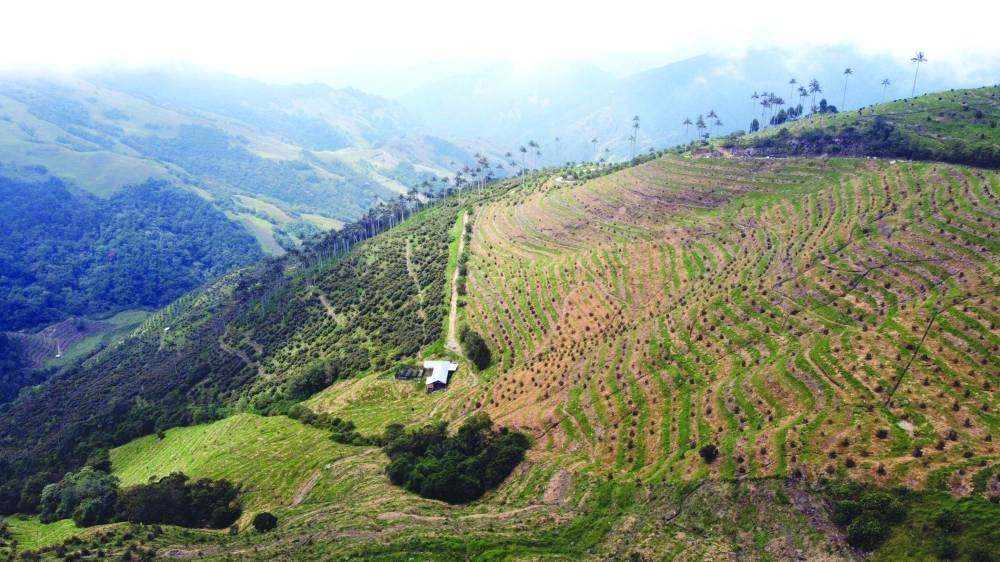During the Super Bowl between the Philadelphia Eagles and Kansas City Chiefs today, millions of armchair fans will tuck into a tasty snack of tortilla chips and guacamole.
But unbeknown to them, in far away Colombia, local farmers are paying the price for their gastronomic pleasure, while environmentalists are warning of water pollution.
The explosion of avocado plantations in central-western Colombia resulted in changing land-use patterns that, in turn, left Jose Hernandez’s coffee crops flooded.
Unlike his neighbours in the Pijao municipality in Quindio department, Hernandez refused to switch to growing the lucrative “green-gold.”
But rivers of water came cascading down from higher up in the mountains surrounding his farm and scouring out ditches up to two metres deep.
The 64-year-old lost 4,000 coffee plants and he points the finger at avocado multinationals who use copious amounts of water and even divert natural streams to satiate their thirsty crops.
“I lost 20 years of work with those waters that fell on me,” Hernandez told AFP.
The Colombian countryside is rapidly being overtaken by crops of the Hass avocado that is mainly exported to the United States, the Netherlands, Spain and Britain.
It is the main ingredient in guacamole.
And demand peaks in the weeks leading up to the Super Bowl — American football’s annual showpiece.
According to Colombia’s agriculture ministry, the country will send more than 1,400 tons of avocados to the United States for consumption specifically during today’s match.
In 2021, total avocado exports were 97,000 tonnes with 55,000 hectares of planted crops.
Colombia is the third-largest producer of avocados after Mexico (2.3mn tonnes) and Chile (186,000 tonnes).
But while leftist President Gustavo Petro has embraced this crop, saying “avocados are more important than oil,” environmentalists warn that the crop can pollute water sources and lead farmers to intrude on protected areas. They add that multinationals have bullied villagers into selling their land on the cheap.
In 2021, the state body charged with protecting the environment in Quindio accused avocado producers of “illegal water harvesting,” “pollution of water sources” and “illegal logging.”
Pijao was once coffee-growing country but now has 789 hectares of avocado crops, a 245 percent increase in seven years, according to the local mayor’s office.
Initially, foreign companies were “unaware” of environmental rules, admits Diego Aristizabal, president of the avocado producers federation, although he claims they now follow them to the letter.
Some from the industry complain of being “demonised” and point to the creation of 26,000 jobs.
But an agro-industrial engineer, speaking to AFP under condition of anonymity for fear of reprisals, said the number of farmers like Hernandez being negatively impacted is mushrooming.
Avocado producers “have not only covered the drains on their own properties but have also allowed water to flow onto their neighbours’ properties ... which causes (soil) erosion” and harms other crops.
Environmental activist Monica Florez says multinationals — mostly from Chile, Mexico and Peru — began arriving in Pijao in 2017, at the exact time that Farc guerrillas were disarming following their December 2016 peace deal with the state.
International
Super Bowl snack hurting Colombian farmers and environment
During the Super Bowl between the Philadelphia Eagles and Kansas City Chiefs today, millions of armchair fans will tuck into a tasty snack of tortilla chips and guacamole.

Aerial view showing avocado plantations and Palma de Cera palm trees, Quindio wax palm (Ceroxylon quindiuense), Colombia’s national tree, which is threatened by avocado crops, in Pijao, Quindío Department, Colombia, taken on Wednesday. (AFP)
